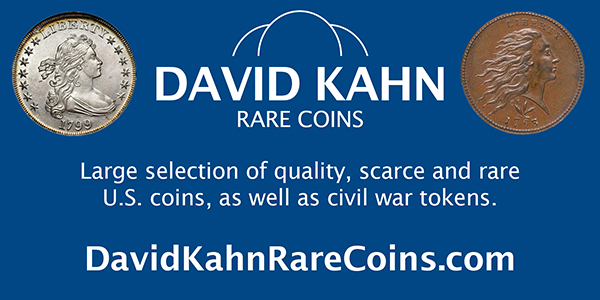
PREV ARTICLE
NEXT ARTICLE
FULL ISSUE
PREV FULL ISSUE
V25 2022 INDEX E-SYLUM ARCHIVE THE UNDEAD CROOKED COIN DEALER
An E-Sylum reader shared this cautionary tale noting, "Thank you for your piece this week entitled,
When in 2014 I told the ANA about my case, its relevant official(s) told me they couldn't help me because the dealer, several years earlier, had stopped paying the annual dues for his own ANA dealer's membership. I said that was a real disappointment, since he still had the certificates of membership-in-good-standing of all the leading professional numismatic organizations festooned around his walls. After I told that to the ANA, I noticed soon afterwards that those certificates had all been removed. I knew the dangers of counterfeiting, especially of 1916-D dimes. But I had been a customer of this dealer for a dozen years, almost entirely in buying and selling precious metals, not collector coins. And we had always had a good relationship. I had trusted him implicitly and just assumed that both coins would be problem-free. My fault. That's what was surprising and disappointing. Since then, I have always said that if that guy needed the money so badly, it's better he cheated me rather than the other way around. I can still look at myself in the mirror in the morning.
Later that year of 2014, the dealer went into an area hospital claiming to customers that he had
a life-threatening illness. Later, when I spoke to his daughter, who often was in the shop (because she
drove him; he had lost his license in 2011 for failing to answer a court summons), she claimed on the
phone: A year or so before my loss, the dealer's shop had been robbed one morning at gunpoint, and he lost $10,000 in cash – perhaps to a disgruntled customer – even though he was, of course, always armed himself. (The dealer was also a military veteran.) On another occasion, I learned from nearby shopkeepers in the same mall that his home had recently been burgled and the family had lost a lot of jewelry, precious metals, cash and other valuables. The incidents were said to have been reported in the newspapers. Because of the robbery of his shop, the dealer tried to sue the mall owner for not maintaining a safe environment. The dealer lost that case, and soon the mall owner moved to evict him for his non- payment of rent.
On top of all that, the family were suing the school district where the dealer's grandson
attended high school, claiming negligence of the school district because the boy had reportedly hurt
himself one day during physical education class. The dealer and his daughter for months claimed they
would repay me, About 1 1/2 years ago, a law firm in New York City wrote to me out of the blue, to say it would take on this case for me on a contingency basis, to search for assets of the dealer, if I agreed, and I did so. I told them how the dealer probably still goes to estate sales and presumably still deals in bullion out of his home, probably using his grandson's surname, which is very different from his own name. This dealer no doubt pulled similar stunts on other trusting customers as the burden of his finances grew desperate, given his medical problems, pending divorce and legal costs. He must have been sued by many others but could declare bankruptcy, sheltering his home under his daughter's name, while surreptitiously hiding his wealth in many ways. It's easy to squirrel away assets that are small in size but significant in value.
It's comforting to know that legal eager beavers are out there scouring the landscape for all the
ways your article suggests that the NYC area investigators, Ahearn and Rambam, Finally, every collector should follow the advice of lawyer Armen Vartian, the long-time legal columnist for Coin World, to whom I wrote in this matter. Mr. Vartian's last CW column appeared in the 15 December 2014 edition, after 18 years of giving advice to CW readers, and summarized his five main rules for coin collectors as follows:
(1)
(2)
(3)
(4)
And (5)
To read the complete article, see:
Wayne Homren, Editor The Numismatic Bibliomania Society is a non-profit organization promoting numismatic literature. See our web site at coinbooks.org. To submit items for publication in The E-Sylum, write to the Editor at this address: whomren@gmail.com To subscribe go to: https://my.binhost.com/lists/listinfo/esylum All Rights Reserved. NBS Home Page Contact the NBS webmaster 
|

